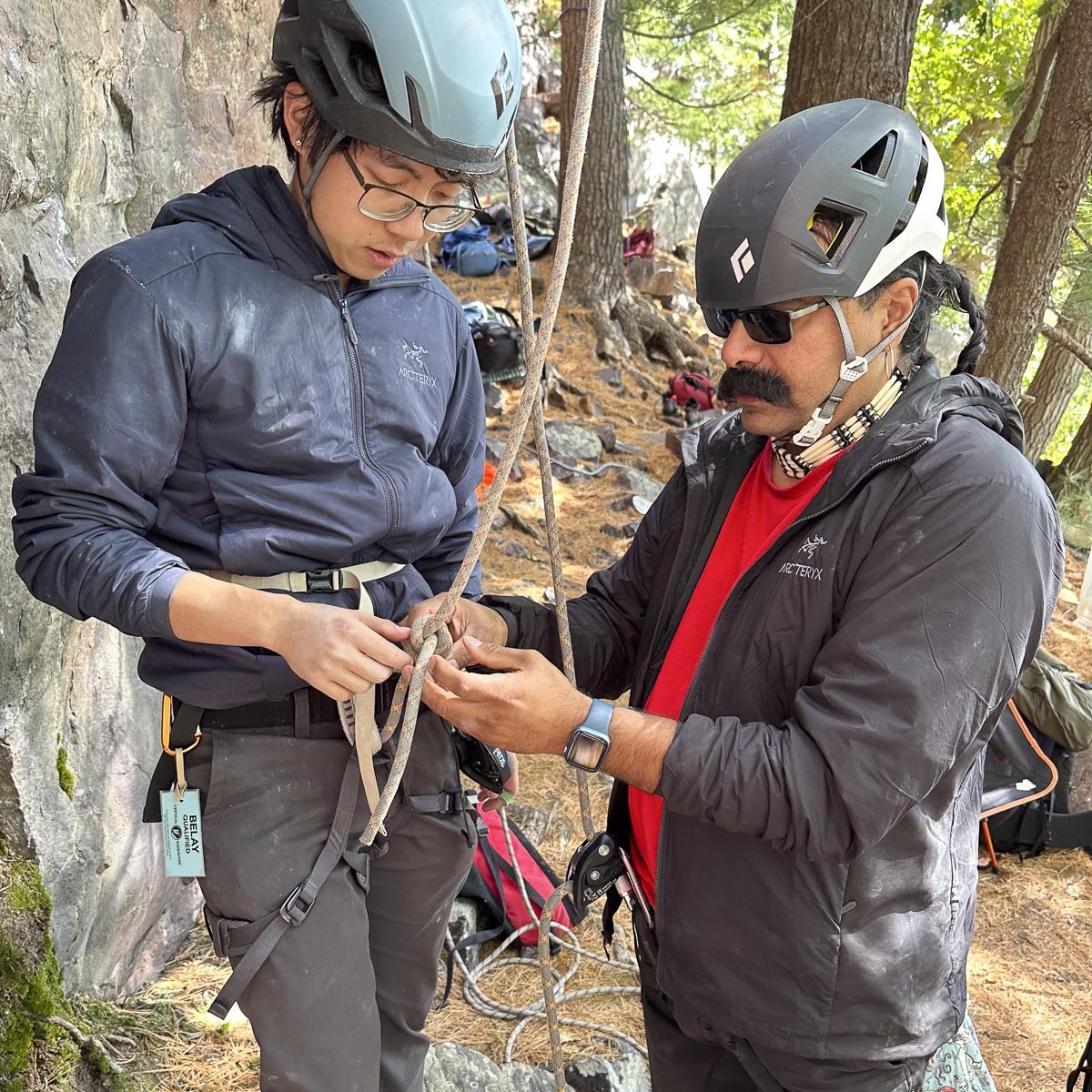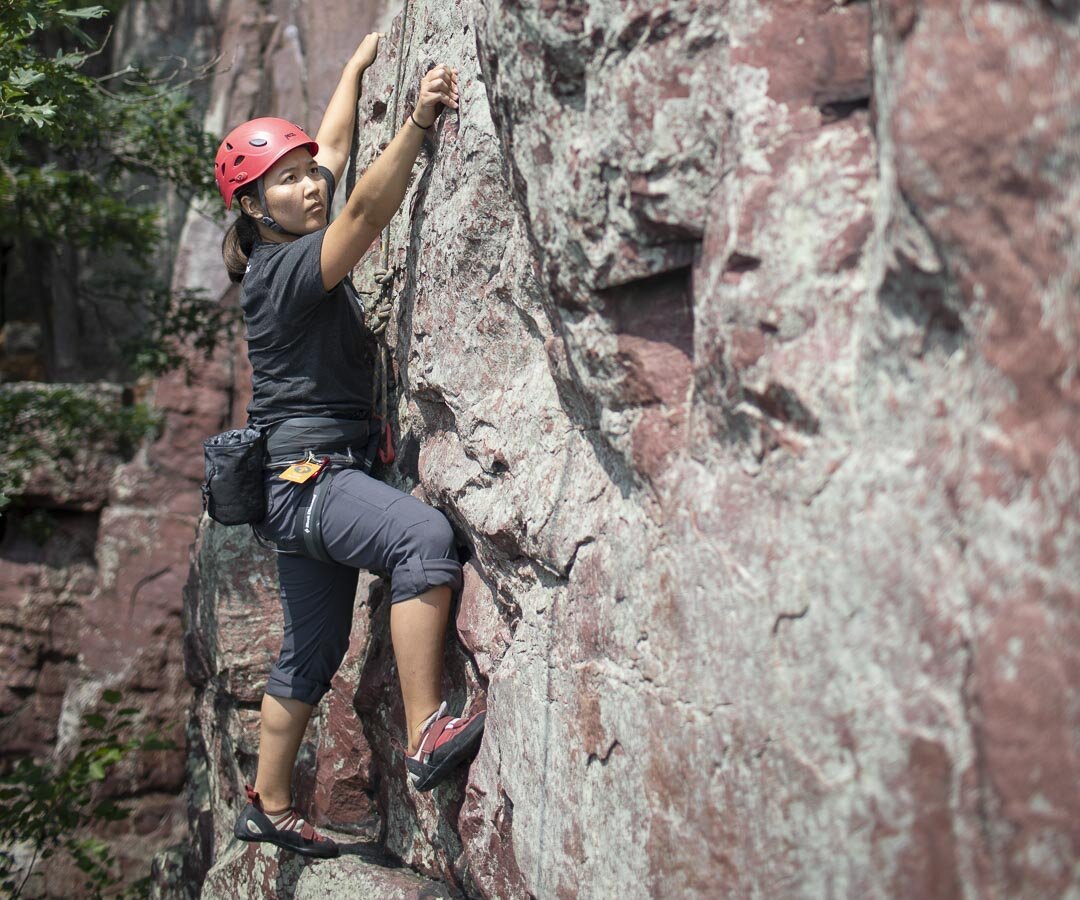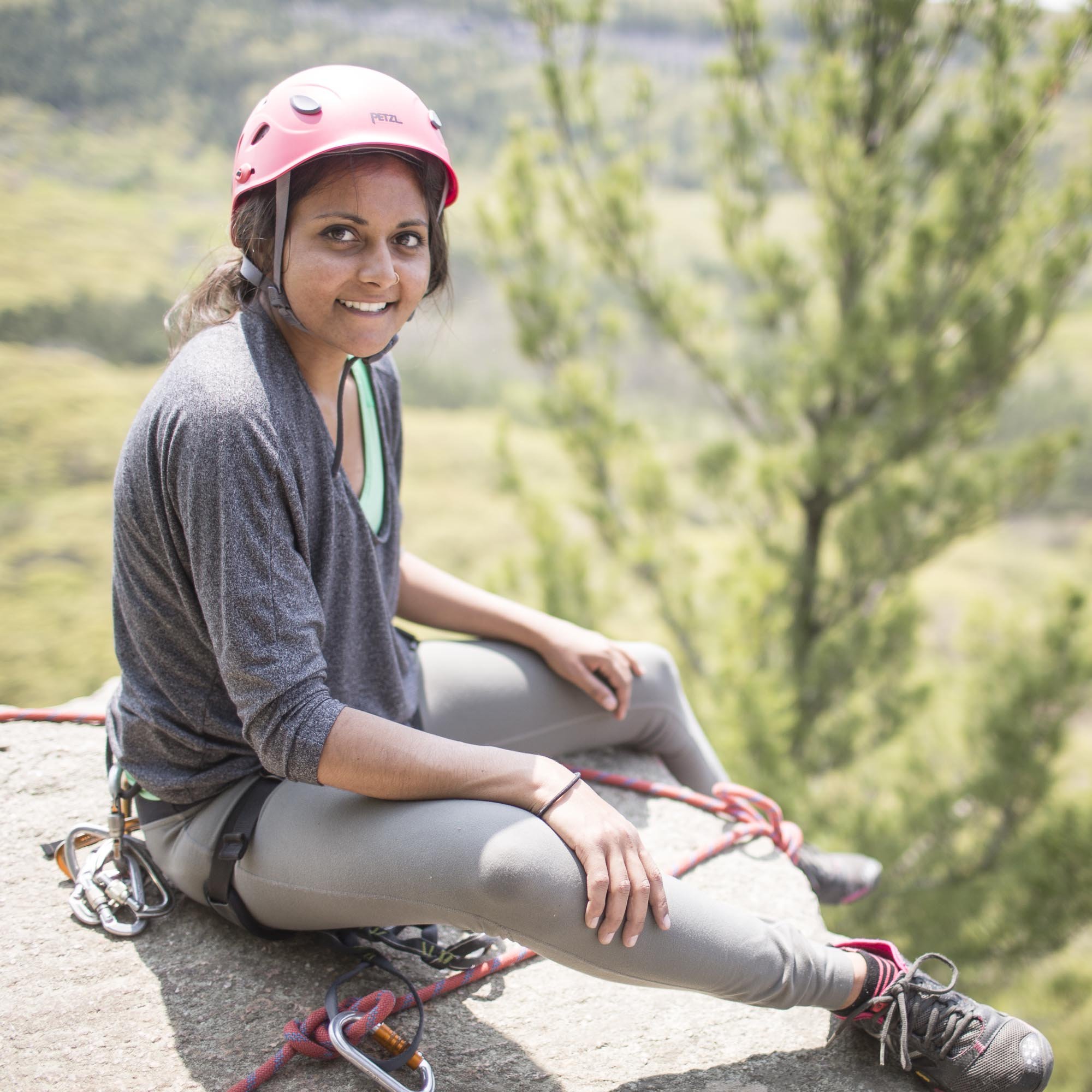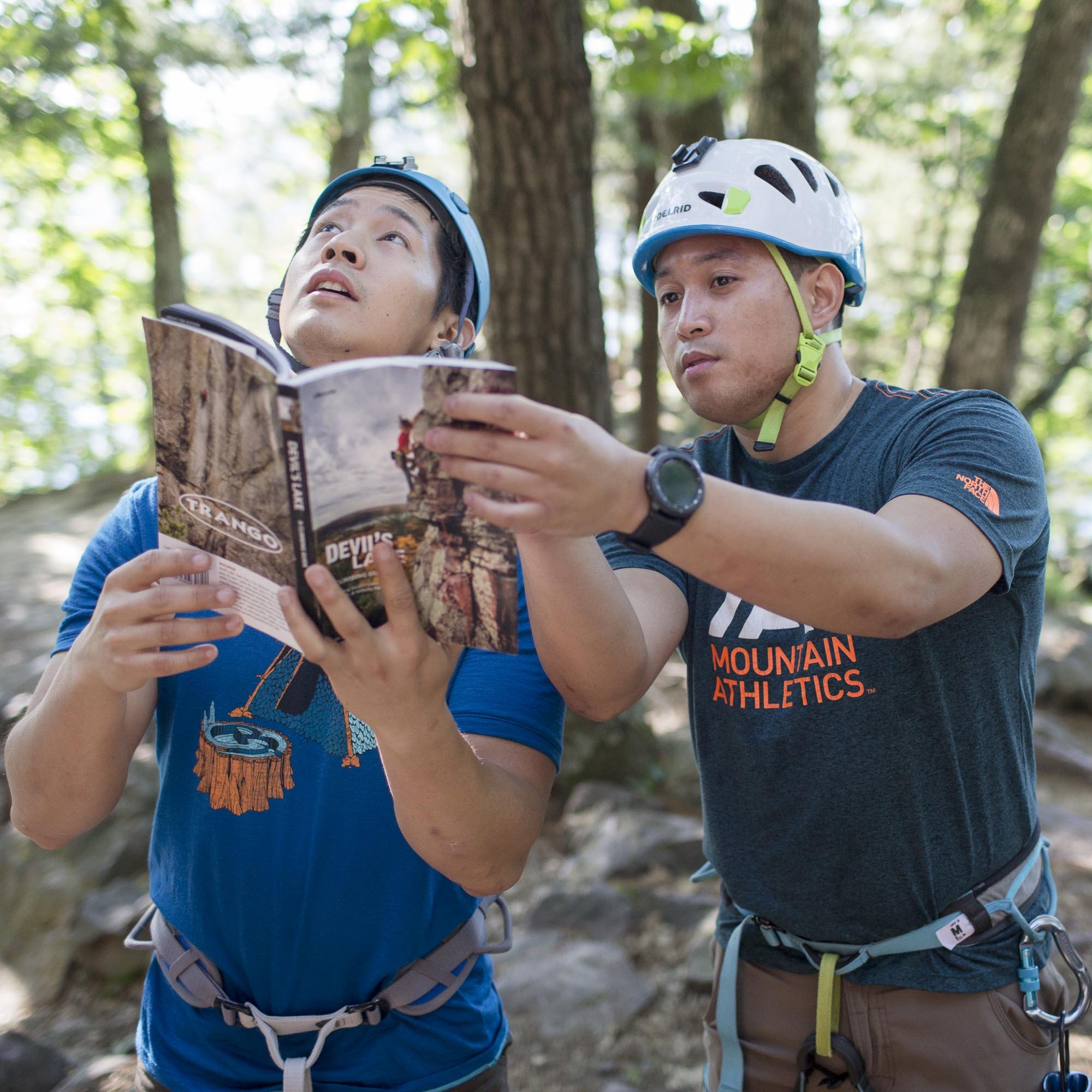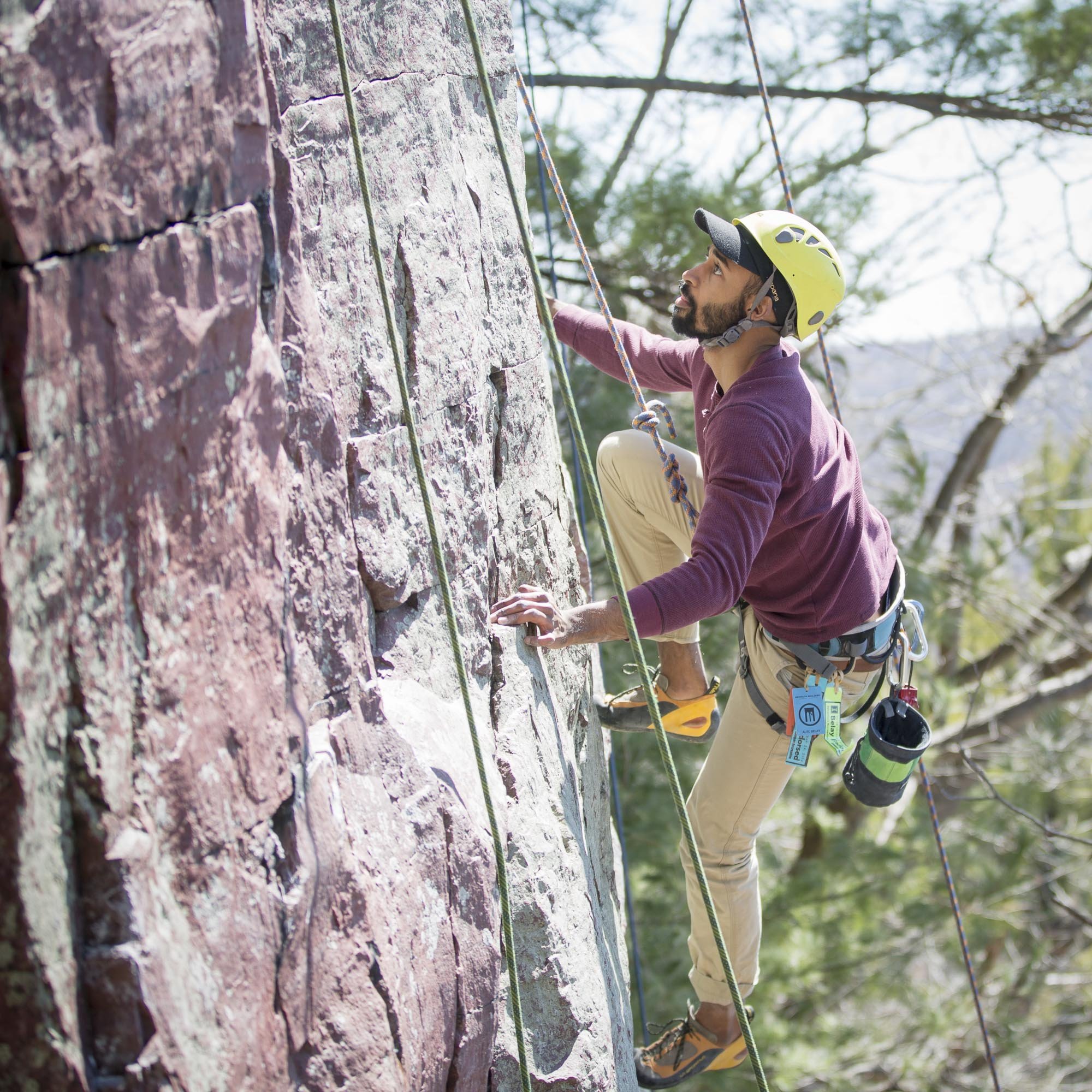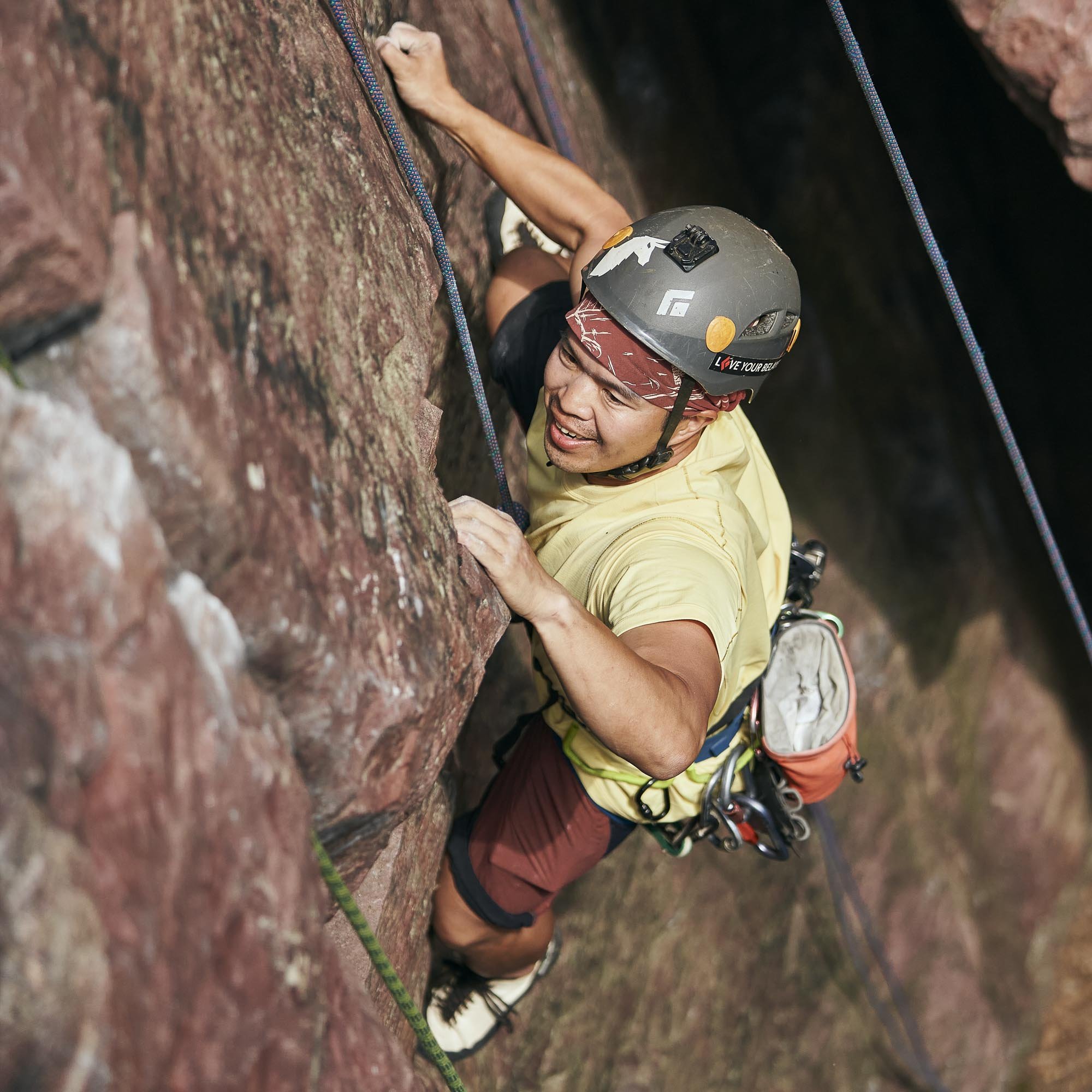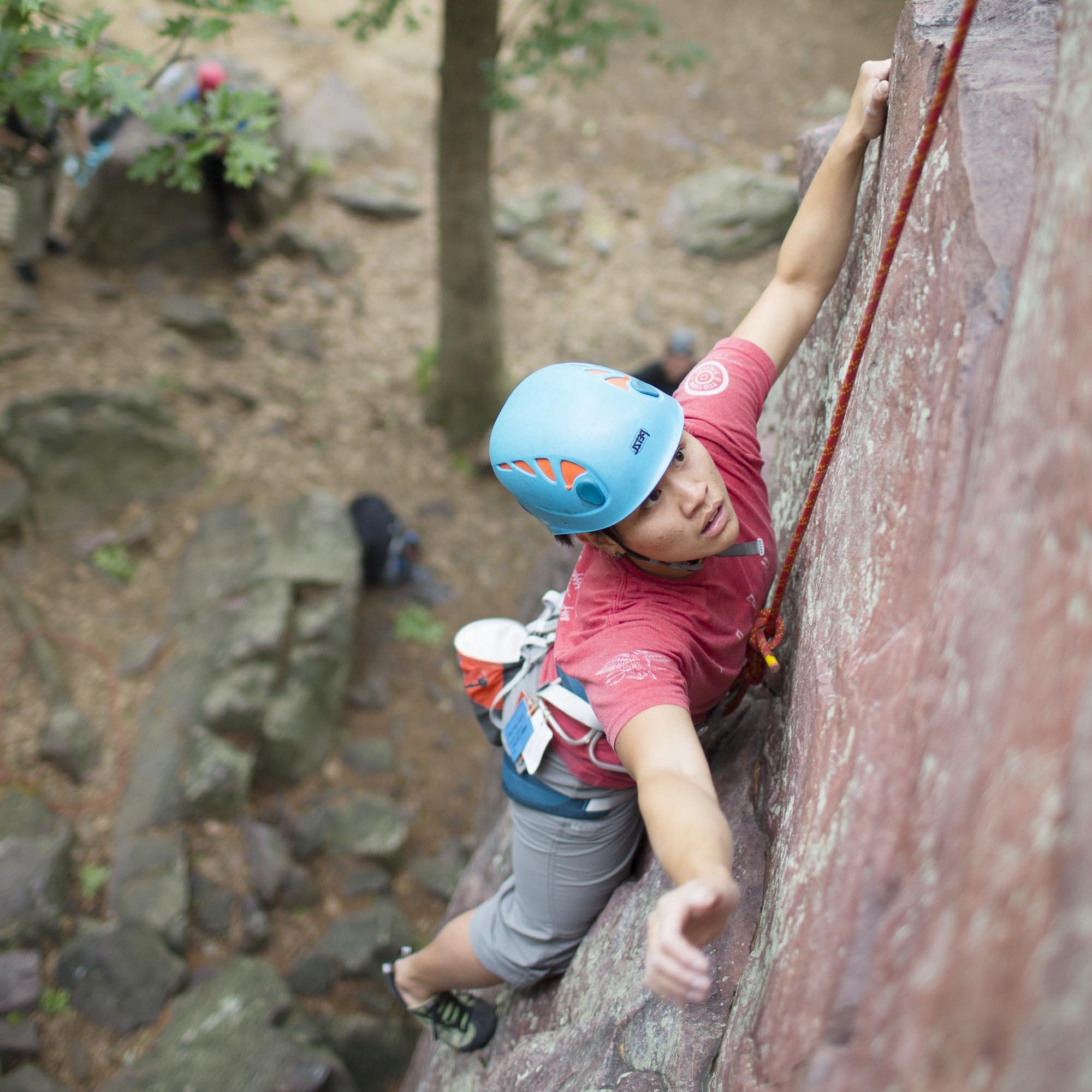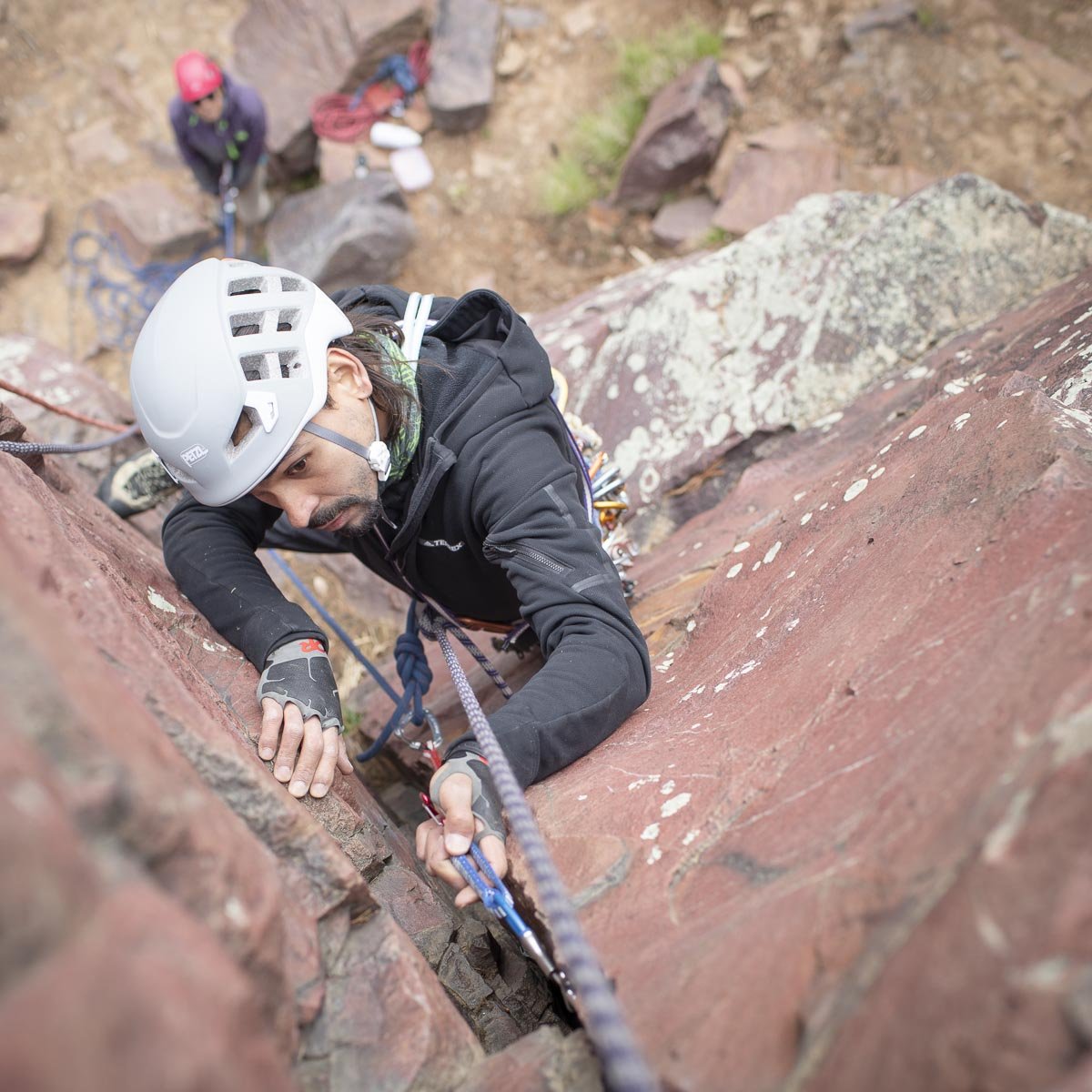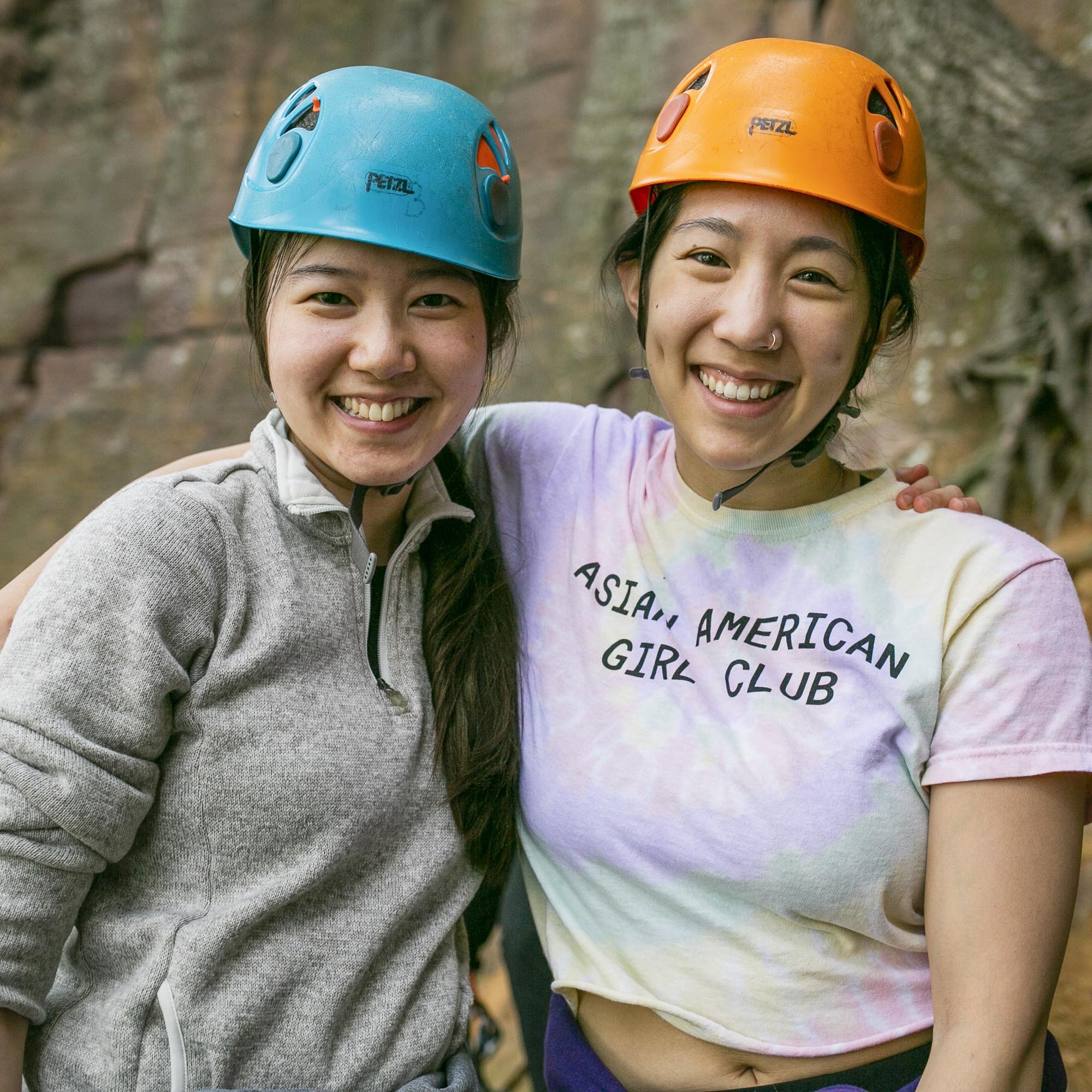Clinic Descriptions
Adaptive Climbing Clinic
Instructors: Kat Floyd, Al Scheiwe, Kyle Harding
If you’re looking to get in some climbing but your physical disabilities or limitations make it difficult to participate in other clinics, this is the place for you! The instructor team is stacked with supportive, experienced instructors ready to offer personalized assistance. Join Adaptive Climbing Group’s Al Scheiwe, Boulders Climbing Gym’s local adaptive outing coordinator, paramedic, and AMGA-certified climbing instructor Kat Floyd, and their team for a day of top-rope climbing, rappelling, and camaraderie on Devils Lake’s East Bluff.
Clinic participants will complete a questionnaire upon registration to help determine the assistance they need to have a comfortable day climbing outside, and Al or Kat will coordinate a plan for success.
Additional support provided includes: assistance accessing the climbing area through a drive-up access permit and vehicle shuttle, specialized harnesses that provide support for all mobility levels, other specialized equipment that allows for a more comfortable climbing experience, and personalized additional support as needed.
Prerequisites: None
Equipment Needed: Personal mobility equipment, closed-toed hiking shoes (if applicable), lunch/calories, hydration, and appropriate climbing clothing. Please bring personal climbing equipment (harness, helmet, climbing shoes, belay device) if you have it.
Bouldering at Devil’s Lake
Instructors: Nicholas Block, Patrick Penne
Bouldering is a type of rock climbing where the climbs, or “problems,” are shorter than typical climbing routes (usually 5 to 20 feet high). Instead of ropes, bouldering uses spotters and thick pads to protect falls.
For a group, bouldering tends to be more dynamic and fluid than roped climbing, since it’s easy to hop on and off a problem, “working the problem” with the group to hone technique. Our instructors demonstrate and coach you on pad placement, spotting, falling, and climbing technique, with plenty of time to just have fun! All experience levels welcome.
Note: Bouldering problems at Devil’s Lake tend to be significantly more difficult than in a gym. A problem rated “V0” at Devil’s Lake might be rated “V2” to “V4” at the local gym. We’ll have lots of fun, but prepare your ego!
Prerequisites: None
Skill Level: Beginner/Intermediate
Equipment Needed: Personal climbing equipment including rock climbing shoes, closed-toed hiking shoes, lunch/calories, hydration, and appropriate climbing clothing. A chalk bag and/or a crash pad are not required, but please bring them if you own them.
Climbing Movement
Instructors: Aria Johnson, Matt Moy, Mal Jasicki
Feeling flat-footed at the gym or crag? Stuck at a plateau you’d like to leave behind? Join this technique-focused climbing clinic where you’ll level up with short lectures, instructor demonstrations, and real-time feedback aimed to improve your movement skills.
We will help you refine your existing abilities, identify and correct problematic practices, and offer advice for your personal climbing technique. Concepts will include power, flow, footwork, center of gravity, body tension, and static and dynamic movement. Just one day of focused practice can help you climb harder and more gracefully!
Prerequisites: None
Skill Level: All skill levels
Equipment Needed: Personal climbing equipment including shoes, harness, helmet, personal anchor and belay/rappel equipment, closed-toed hiking shoes, lunch/calories, hydration, and appropriate climbing clothing.
Introduction to Climbing Anchors
Instructors: Mark Grman, Gokul Gopal
Anchor building is a fundamental skill for every outdoor climber. If you’ve never slung a tree or you don’t know a BHK from an HMS, join us for an introductory anchors course. You will learn safe, secure systems for building anchors, foundational knots, equipment, rigging and how to use natural protection (trees & boulders). Those familiar with building anchors may enjoy gaining familiarity with new, modern approaches to systems and rigging techniques. All students will have opportunities to set multiple anchors and receive peer and instructor feedback. Plan on lots of anchor practice, but little actual climbing.
Prerequisites: None
Skill Level: Beginner
Equipment Needed: Personal climbing equipment including shoes, harness, helmet, personal anchor and belay/rappel equipment, closed-toed hiking shoes, lunch/calories, hydration, and appropriate climbing clothing. If you have your own rigging material (75 - 100’ static line, 6 - 8 carabiners, 1-2 48” slings) we encourage you to bring it as instructors will have limited amounts to share and you’ll have the opportunity for hands-on training with it.
Intermediate Climbing Anchors
Instructors: Sarah Geers, Wil Barajas
Advance your anchor building skills in this one day course. Students will build on the fundamental concepts presented in Intro to Traditional Climbing Anchors, expanding to more complex anchoring systems. Students will learn how to identify, place, evaluate, remove and incorporate traditional hardware (cams, nuts, etc.) into anchor builds. Plan on lots of anchor practice, but little actual climbing.
Prerequisites: Prior experience setting anchors required
Skill Level: Intermediate
Equipment Needed: Personal climbing equipment including shoes, harness, helmet, personal anchor and belay/rappel equipment, closed-toed hiking shoes, lunch/calories, hydration, and appropriate climbing clothing. Please bring a rack of hardware/protection if you have one, as instructors will have a limited amount of gear to share.
Intro to Outdoor Climbing @ Devil’s Lake
Instructors: JD Dryer, Rodel Querubin
Are you new to outdoor climbing? Do you want to better understand how a climbing day “works” and be able to contribute to an outdoor climbing team? Let us show you the ropes!
Join a welcoming group for a day of top-rope cragging and rappelling, and gain the skills needed to pull your weight on an outdoor climbing team. You’ll walk away having a better sense of the planning and skills required to climb on your own outdoors, and familiarity and skills to help you move beyond “rookie” to “asset” in any climbing group. Our curriculum will include:
the basics of outdoor climbing systems
how to identify and manage risks
what and how to pack for a crag day
how to read and interpret a guide book
how to navigate typical climbing terrain
the basic components of traditional anchor systems
how to rappel
how to coil a rope that won’t fall apart when you pass it to your partner
We will tailor the specific curriculum on the experience and goals of the group, but this course will allow for some climbing time in addition to skills practice. After this course, you’ll have the confidence to seek new invitations and hold your own at the crag!
**Note: Devil’s Lake is not a sport climbing area. We will not be discussing lead climbing or cleaning anchors in this clinic.**
Prerequisites: No prior experience necessary
Skill levels: All skill levels are welcome, but this clinic best serves those new to climbing outdoors.
Equipment Needed: Personal climbing equipment including shoes, harness, helmet, close-toed hiking/walking shoes, appropriate climbing clothing. Please also bring closed-toed hiking shoes, lunch/calories, hydration, lunch/water, appropriate hiking & climbing shoes and clothing. Whatever’s needed to stay comfortable and cared for at the crag.
Introduction to Traditional Lead Climbing
Instructors: Tyler Davis, Jordan Owen, Danny Vasquez
The biggest reason to learn trad is the vast opportunities the skill opens to climb both in your backyard and around the globe. In this clinic, we’ll teach real world skills to climb real world trad, but we’ll focus on grades that help you learn to place sound protection, manage a rope line, and route-find.
We teach all lead climbing curricula on "mock-lead," meaning the leader is always connected to a top-rope system in addition to a lead rope. Meanwhile, your instructor ascends next to you on a fixed line, enabling in-the-moment feedback, consultation and reassurance.
This course will review traditional gear placement and anchor systems, and build fundamental lead climbing skills. We will emphasize placing solid gear on lead and artfully belaying a lead climber.
Prerequisites: Some initial climbing and belaying experience is important. It’s hard to learn to lead anything without some basic top-roping experience.
Skill Level: Beginners and sport climbers will get the most out of this clinic. More experienced traditional lead climbers might enjoy a refresher and feedback from the instructor, but this clinic focuses on introducing trad climbing to a newer audience.
Equipment Needed: Personal climbing equipment including shoes, harness, helmet, personal anchor and belay/rappel equipment, closed-toed hiking shoes, lunch/calories, hydration, and appropriate climbing clothing. Please bring a rack of hardware/protection if you have one, as instructors will have a limited amount of gear to share.
**Note: This course does not include or focus on sport lead climbing.**
Open Group Climbing
Instructors: Nick Wilkes, Ivy Lueng, Glenn Poole
Join us for a fun, casual day of guided top-rope climbing. Instructors will set up a variety of routes for participants to climb. Participants will learn to belay, if needed, and spend the day climbing and building community with a supportive group of climbers.
Open Top-Rope is similar to showing up at a climbing gym to climb… the ropes are up and all you need to do is connect with a belay partner, tie in and start climbing. If you’d like to learn more about the process of climbing outside, check out Intro to Outdoor Climbing (see clinic description).
Prerequisites: None
Skill Level: Any level
Equipment Needed: Personal climbing equipment including shoes, harness, helmet, personal anchor and belay/rappel equipment, closed-toed hiking shoes, lunch/calories, hydration, and appropriate climbing clothing.
Self-Rescue for Rock Climbers
Instructors: Chris Van der Linden, Chuck Stark
Eventually, every climber finds themselves in a pickle. Imagine these scenarios:
You accidentally drop your belay device down a 100’ cliff.
Your partner, who is allergic to bees, is stung while belaying.
Your climbing rope gets hopelessly stuck in a crack when pulling it down.
A thunderstorm moves in halfway up a 10-pitch route and you need to bail.
These are just a few examples of why every climber should know self-rescue skills. Learn the skills needed to solve basic problems, handle realistic retreats, and devise self-rescues (avoid calling for help) in a single pitch environment.
We will practice ascension, pulley systems, raising or lowering a teammate, improvised rappels and more. We will also learn tips about how to spot a bad situation before it turns into a rescue, so you can avoid the epic!
Prerequisites: All climbers are welcomed to participate, and there will be something valuable for any student. Students more experienced with multipitch climbing will have more context for the skills presented. Students who are already familiar with the use of GriGri for top-rope and lead belay comprehend and master the rescue components more quickly. However, students who have never seen a GriGri before can still have a valuable clinic experience.
Skill Level: All skill levels
Equipment Needed: Personal climbing equipment including harness, helmet, personal anchor and belay/rappel equipment (including an autoblock device if you own one), 48” nylon sling or cordelette, prussic loop, and 2 or 3 locking carabiners and 4-6 non-locking carabiners (they can be part of alpine draws or quick draws). Please also bring closed-toed hiking shoes, lunch/calories, hydration, lunch/water, appropriate hiking & climbing shoes and clothing.

